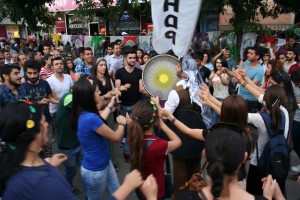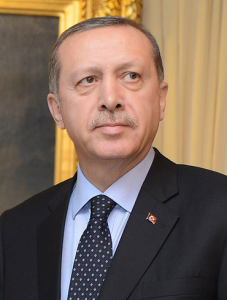There are disturbing signs that the latest electoral victory for President Erdoğan’s party could result in the entrenchment of an authoritarian regime. WILLIAM GOURLAY looks at the lead-up to the 1 November elections, and the aftermath.
The general election in Turkey on 1 November surprised pundits and politicians alike when the Justice and Development Party (AKP) returned to majority winning 317 of 550 seats and a resounding 49 per cent of the vote.
This was a stunning reversal on the AKP’s performance in the election of 7 June, when it lost its parliamentary majority for the first time in 13 years and the Kurdish-focused People’s Democratic Party (HDP) was catapulted into parliament.
The June election was heralded by many as the beginning of the end for the AKP, which after first winning government in 2002 had strung together a succession of electoral victories, but which since the Gezi Park protests of 2013 has suffered several setbacks. After June, however, Turkey entered a period of political uncertainty as the AKP and fractious opposition parties attempted to form a coalition government. When coalition talks failed, President Recep Tayyıp Erdoğan called November’s snap election.

In the political impasse that followed the June election, security concerns escalated within Turkey. An ISIS bomb attack that killed a group of mostly Kurdish activists in the border town of Suruç in July up-ended the fragile peace that had prevailed in Turkey’s Kurdish-populated provinces for several years. Kurdistan Workers’ Party (PKK) members, claiming Turkish government complicity in the bombing, murdered several Turkish police in a reprisal attack. Several pro-HDP mayors in the southeast subsequently declared autonomy, and the YDG-H, the youth wing of the PKK, took control of several towns. In response the government sent in the military and began air raids on PKK bases in Iraq. The three-year-old PKK ceasefire comprehensively collapsed and southeastern Turkey descended into a spiral of violence.
Events in the southeast were illustrative of a highly polarised society and a troubled political arena. In the weeks before the November election, the government moved to close several critical media outlets and there were several attacks, mostly by pro-government groups, on media outlets and journalists.
Amid increasing incidents of nationalist violence, largely directed at Kurds and opposition groups, ISIS struck again. Suicide bombers killed over 100 marchers at a peace rally in Ankara. Prime Minister Ahmet Davutoğlu and President Erdoğan claimed, implausibly, that ISIS, the PKK and agents of Syrian President Bashar al Assad had collaborated to carry out the attack.
After the bombing, the HDP, whose supporters made up the majority of those killed, cancelled further rallies in the lead-up to the election. Again highlighting the polarisation within Turkey, ultra-nationalists jeered at a football match during a minute’s silence for the victims of the bombing, which, incidentally, was the worst incident of terrorist violence in Turkey’s history.
Many analysts saw the government’s fear tactics and press closures as signs of desperation in anticipation of another electoral defeat.
Prominent Turkey analyst Mustafa Akyol observes that different camps viewed the turmoil unfurling from entirely different perspectives. He notes that oppositional voices accused the government of fomenting chaos in order to win back the support of the electorate, while pro-government pundits accused unnamed external forces of conspiring to undermine Turkey.
In this milieu, the AKP ran an election campaign emphasising ‘stability’, arguing that it was the only party that could re-establish order and restore Turkey to an upward trajectory. Prime Minister Ahmet Davutoğlu warned that without the steady hand of an AKP government the country would lurch back into the political trauma that characterised the 1990s, while Erdoğan repeatedly claimed that the HDP was an extension of the outlawed PKK.
Many analysts saw the government’s fear tactics and press closures as signs of desperation in anticipation of another electoral defeat. Most polls predicted similar results to the June election. The ‘stability’ message clearly resonated with large segments of the electorate, however, the AKP winning back voters across the political spectrum, both from the Kurdish-aligned HDP and from the Nationalist Action Party (MHP), a party noted for its far right, anti-Kurdish position.
The AKP’s resurgence demonstrates that, despite its unexpectedly poor result in June, it remains the most effective political machine in Turkey. Abetted by media coverage skewed disproportionately in its favour, it ran a disciplined campaign while also playing on fears about instability that some accuse it of stoking.

The opposition parties, for their parts, failed to capitalise on the momentum they had gathered in the June general election. Former Republican People’s Party (CHP) parliamentarian Aykan Erdemir laments that in doing so they missed what may have been a last opportunity to reclaim a political system that he sees as increasingly being co-opted and controlled by the AKP and aligned interest groups.
In his victory speech, Prime Minister Davutoğlu congratulated voters for choosing stability and declared that his government would embrace all of the electorate. Some observers opined that having re-established its parliamentary majority the AKP may now take a more conciliatory and less authoritarian approach and tone down what had at times been divisive rhetoric. Others predicted that President Erdoğan, having shored up his position, was likely to further pursue his enemies and push his own political agenda.
In the wake of the election, it appears that the latter is the case. There has been no let-up in government moves to close down critical and dissenting voices in the media. In the southeast, the conflict with the PKK continues. State security agencies have imposed curfews on the Kurdish-populated cities of Silvan, Cizre and Nusaybin, with the number of Kurdish civilian deaths growing. In several cities, Turkish soldiers sprayed ultranationalist, anti-Kurdish graffiti on homes as they departed.
Meanwhile, within days of the AKP victory, Erdoğan’s office raised the idea of re-examining the status of the presidency. Prior to the June election Erdoğan campaigned very hard on the need for a new executive presidency, one that would grant him extensive powers. The results in June suggested the electorate did not approve of such a move, thus the idea was shelved during the recent campaign. Victory now achieved, it appears that the government still plans to pursue the matter.
Leader of the HDP Selahattin Demirtaş argues that such a presidential model would result in a constitutionally approved dictatorship. Others view things differently. One noted pro-government pundit sees the adoption of an executive presidency as a step towards Erdoğan assuming the position of caliph.
Many fear the AKP’s latest electoral victory will result in the entrenchment of an authoritarian regime. An EU report held back until after the election details concerns about human rights violations, and backsliding on the independence of the judiciary and on press freedoms.
The G-20 summit hosted by Erdoğan in the southern city of Antalya on 15–16 November therefore came as an opportunity for Turkey to redeem its international reputation. However, the impact of any Turkish charm offensive was minimal in the wake of ISIS’s Paris attacks. The recent shooting down of a Russian warplane near the Turkey-Syria border will only complicate Turkey’s diplomatic position in the near future.
The Turkish electorate apparently voted for stability in the election of 1 November and the AKP asserts that it alone can ensure security. It remains to be seen if it can be true to its word.
Main photo:
The Turkish electorate voted for ‘security’ by delivering a resounding victory to President Recep Tayyıp Erdoğan’s Justice and Development Party (Image credit: Caribb, Flickr).
